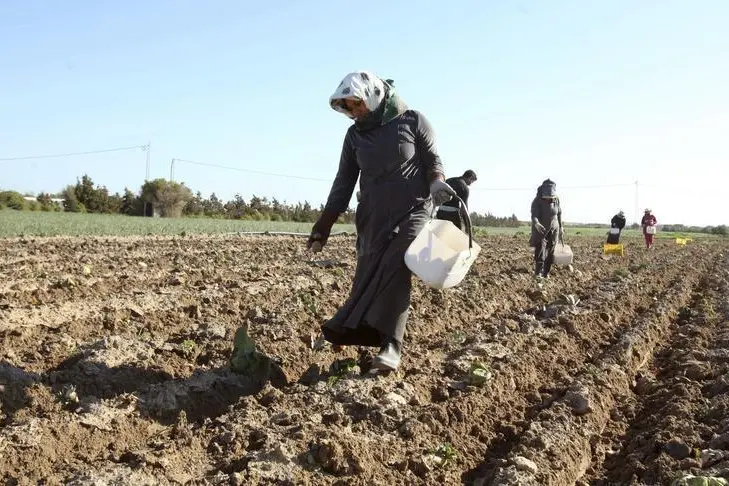PHOTO
Tunisia - Professionals of the grain, olive and poultry sectors in Tunisia, meeting at the North African regional office of the African Development Bank (AfDB) in Tunis, expressed keen interest in participating in the "Summit on Food in Africa - Unlocking Africa's Food Potential" to be held from January 25 to 27, 2023, in Dakar (Senegal).
African heads of state and government will mobilise their government resources, development partners and private sector financing at the AfDB summit to harness Africa's agricultural and food potential, to transform advocacy efforts into concrete actions to build the sector's resilience in the face of the combined post-COVID-19 crisis, the invasion of Ukraine and the effects of climate change, the AfDB said in a statement issued on Wednesday in Tunis.
The AfDB Group's Director General for North Africa, Mohammed El Azizi, said that "by bringing together around the same table policymakers, professionals from the agricultural sector, international organisations and investors, the Dakar 2 Summit will provide a decisive response to the financing needs of the African agribusiness.
On the Tunisian side, the aim is to open up prospects for collaboration on a national and also African scale, by paving the way for public-private partnerships in the agricultural sector.
Tunisian agri-food industrialists could thus make available to sub-Saharan African countries rich in water resources their know-how and their internationally recognised expertise in such promising sectors as the olive, cereal and poultry industries.
In the poultry sector, Tarek Chaouch, Director General of the Groupement interprofessionnel des produits avicoles et cunicoles (GIPAC), recalled that the Tunisian poultry sector - one of the flagships of which is the Poulina group - is among the top six in the world in terms of health and quality standards.
He stressed that "poultry has a promising future in Africa. Consumption has increased tenfold in 10 years and the sector is expected to grow by a cumulative 30% by 2031.
Tunisia's reputation is such that foreign companies come to set up in Tunisia, says General Manager of Poulina, Mohammed Chikhaoui. This group is among the top six in the world, as is the company Chahia, ranked 5th worldwide in terms of respect for national standards and quality.
As for the olive sector, where Tunisia is ranked among the first-world producers (2nd after the European Union), the industrialists of the sector present at the Tunis meeting agreed to organise an in-depth consultation between public operators (the Olive Institute, the National Oil Office, the Ministry of Agriculture), private professionals, the AfDB and the International Olive Oil Council for key actions.
Faced with the scarcity of water resources in Tunisia, Tunisian operators have expressed a marked interest in exploring the potential and possibilities of extension in African countries suitable for this crop.
"We are quite willing to share our know-how with countries whose climatic and hydrological conditions allow it," says Abdessalem Elwad, general manager of the Rivière d'Or company and representative of the profession at the Tunisian Confederation of Industry, Trade and Handicrafts (UTICA) and a member of the International Olive Oil Council.
"This South-South partnership could take the form of a pilot operation based on the model of public-private partnerships that would make it possible to test the cultivation of the traditional Tunisian olive tree in other regions of the continent," says Abdelaziz Makhloufi, General Manager of the CHO company (olive oil packaging).
In this regard, the AfDB recalled that it has already initiated the idea of introducing the olive tree in Mauritania and has undertaken a study in 2019, proposing potential sites suitable for this introduction. The idea of carrying out full-scale tests was also raised by representatives of the cereal sector.
The Dakar Summit would make it possible to organise an in-depth consultation between public operators (the National Institute of Field Crops, the Tunisian Cereals Office, the Tunisian Chemical Group), the private sector, the AfDB and specialised research structures such as the Mohamed-6 Polytechnic University of Benguerir in Morocco, which is part of the Cherifian Phosphates Office.
This partnership, based on a relevant international research programme on cereals and forgotten crops particularly suited to Africa, could lead to the development of an African cereal potential map with a three-year action plan for 2023-2025.
For Mohammed Nadri, Director General of the Central Wheat Cooperative (COCEBLE), which groups 13,000 farmers representing 25% of Tunisian wheat production, "Tunisia has the expertise to help other African countries increase their production and productivity.
By launching a pilot experiment in the cereal sector in 4 or 5 sub-Saharan African countries, Tunisia could conduct a research programme on resilient varieties adapted to the climatic context and adapted crop management.
The installation of these test and demonstration plots could lead to enormous potential, especially since the reintroduction in Tunisia of traditional varieties formerly cultivated by the Romans has given much higher yields than in Italy, says Abdelmonem Khlifi, manager of the company STIMA.
© Tap 2022 Provided by SyndiGate Media Inc. (Syndigate.info).





















